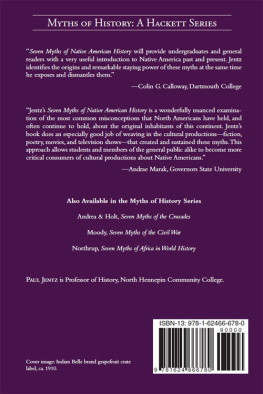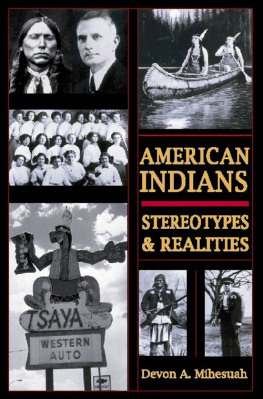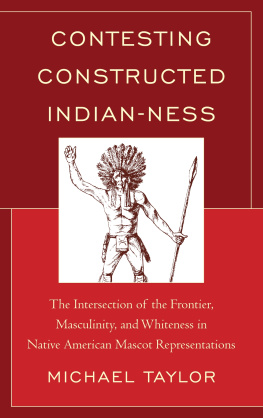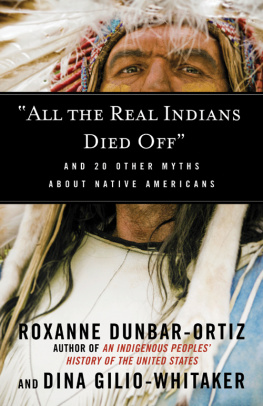Rich Indians
2010 The University of North Carolina Press
All rights reserved
Designed and set in Arnhem and Serifa by Rebecca Evans
Manufactured in the United States of America
The paper in this book meets the guidelines for permanence
and durability of the Committee on Production Guidelines for
Book Longevity of the Council on Library Resources.
The University of North Carolina Press has been a
member of the Green Press Initiative since 2003.
Library of Congress Cataloging-in-Publication Data
Harmon, Alexandra, 1945
Rich Indians: Native people and the problem of
wealth in American history / Alexandra Harmon.
p. cm. Includes bibliographical references and index.
ISBN 978-0-8078-3423-7 (cloth: alk. paper)
ISBN 978-1-4696-0689-2 (pbk. : alk. paper)
1. Indians of North America Economic conditions. 2. Indians of
North America Social conditions. 3. Indians of North America
Social life and customs. 4. Rich people United States History.
5. Wealth Social aspects United States History. 6. Wealth
Moral and ethical aspects United States History. 7. Social
change United States History. 8. United States Ethnic
relations. 9. United States Economic conditions. I. Title.
E98.E2H37 2010 973.04'97 dc22 2010018368
cloth 14 13 12 11 10 5 4 3 2 1
paper 16 15 14 13 12 5 4 3 2 1
Contents
Illustrations
DeBry depiction of Pocahontas
Portrait of Pocahontas in London
Portrait of Joseph Brant
Home of Rich Joe Vann
Portrait of Major Ridge
Residence of William B. Moon
House of full-bloods, Five Civilized Tribes
Portrait of Pleasant Porter
Colliers on Osage wealth
Cover illustration from American Indian magazine
Osage feast
Portrait of Bacon Rind
Faces of Indian poverty
Judge Boldt wanted poster
Interstate Congress for Equal Rights and Responsibilities booklet
Marty Two Bulls cartoon
Acknowledgments
This book has been a decade in the making partly because I was shy about consulting with other scholars as I planned and launched into research. But when I did seek help identifying sources or analyzing them, and when I asked colleagues to read drafts, many people gave generously of their time, expertise, and encouragement. I am profoundly grateful to them all and want to acknowledge the important ways they supported a long, challenging project.
I am especially indebted to Richard Johnson, Frederick Hoxie, Sven Beckert, David Kleit, Jeff Ostler, Brian Hosmer, Colleen ONeill, Paul Rosier, and Jessica Cattelino for reading chapter drafts. The final versions benefited from their frank, incisive, fair-minded critiques and valuable suggestions. John Findlay, Ben Schmidt, Linda Nash, and other members of the University of Washington history faculty research group also offered useful comments on an early draft of chapter one.
I had capable research assistance from Beatrice Marx, Jen Seltz, and Christopher Herbert. Richard Johnson, Colleen Boyd, David Getches, Luana Ross, and Dan Hart supplied me with significant specific sources. And I thank Clara Sue Kidwell for the warm hospitality she extended during my sojourn in Norman, Oklahoma, for research.
A grant from the Institute for Ethnic Studies in the United States at the University of Washington covered some early research expenses. I was fortunate as well to receive a fellowship from the University of Washingtons Simpson Center for the Humanities, affording a brief leave from teaching and stimulating discussions with other fellows at a crucial time in my research. I have also had the support and encouragement of my colleagues in the American Indian Studies department, particularly our chair, Tom Colonnese.
Librarians, archivists, curators, and historical society staff are essential partners in a historical research project, and I had the help of many such hardworking people at the National Archives, University of Washington Libraries, Oklahoma Historical Society, University of Oklahoma Western History Collections, Library of Congress, New York State Historical Association, and Denver Public Library.
It was my good fortune to meet University of North Carolina Press acquisitions editor Mark Simpson-Vos just as the time came to seek a publisher. His belief in the value of the project gave me needed confidence as I made last revisions. Mark, Ron Maner, Ren Hayden, and other press staff have moved the manuscript expeditiously toward production, responding promptly and encouragingly to my questions and offering wise, welcome advice.
Rich Indians
Introduction
The late 1990s were a heady time for believers in the bounty of American capitalism. Bullish investors stampeded into the stock market, and share values inflated rapidly in the heat of their frenzy. Week after week, the media announced ballooning personal fortunes, especially from new information technology ventures. Although most people in the United States got no financial boost from the boom, the fortunate ones seemed to show what was possible in an expanding economy. They could gleefully rake in wealth without incurring much public censure.
Political scientist Andrew Hacker observed in the New York Times that Americans know the rich are getting richer yet appear ambivalent about the upward flow of money.... Even those unsettled by the shift in wealth seem hesitant about framing the discussion in moral terms. When contemplating the hyperinflated incomes of celebrities, they focus less on whether greed is good or bad than on... when or which superpayments may be deserved. Hacker himself did not impute greed or amorality to lavishly paid individuals. In fact, Americans reluctance to define extreme wealth as a moral problem made sense to him. For many political and economic reasons, Hacker wrote, the 1990s have surpassed the 1980s in creating opportunities for becoming rich. And those who do, much like the rest of us, see no reason to refuse what comes their way.
The temperature of the economy cooled abruptly in the next decade, and many high-flying speculators lost altitude, but the upward flow of money continued. Not only did the wealthiest people add to their wealth at an extraordinary rate, but politicians advocated or acquiesced in legislation that increased the trends momentum. Once again some analysts noted that expressions of moral indignation or concern about social justice were muted. Economist Paul Krugman had an ear cocked for sermons about selfishness
From Seattle, an epicenter of the so-called dot-com business boom, I followed the developments these pundits analyzed, and I shared their perception that critical commentary couched in ethical or ideological principles was scarce, at least in mainstream media. Most reports of soaring private fortunes seemed celebratory. I hoped to hear debate about the compatibility of headlong profit-seeking and extreme income disparities with other national ideals, but my wish went unfulfilled. The surge of moneymaking did not arouse much public soul-searching.
At the same time, I followed a story of growing affluence in another demographic minority and noticed discourse of a different sort. American Indians barely more than one percent of the U.S. population had launched enterprises that were earning them millions of dollars and avid interest from journalists. A sizable number of Indians responded to this turn of events with calls for sober refection on the values that ought to motivate their economic activity. One was Marty Firerider, an Anishinaabe man in San Diego, where Indian tribes were banking fabulous profits from casinos. Firerider lamented that some of the prospering tribes had turned a blind eye to the needs of their Indian neighbors. Indian country is threatened with disunity, he warned, because with wealth come greed and power.... Acquiring or possessing more than what one needs (self greed) is not the Indian way.






